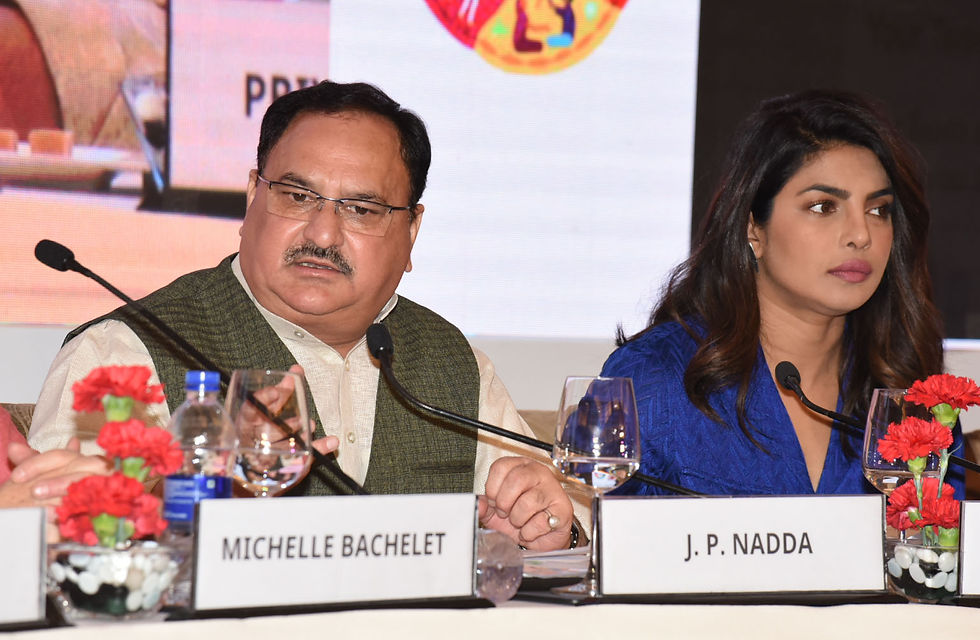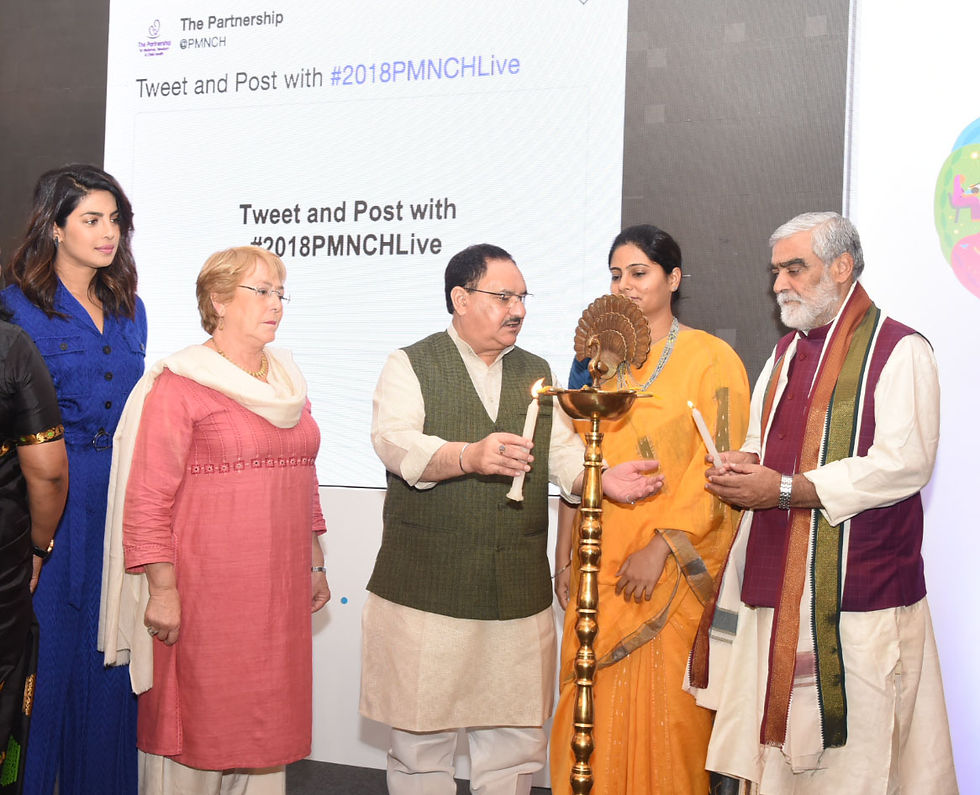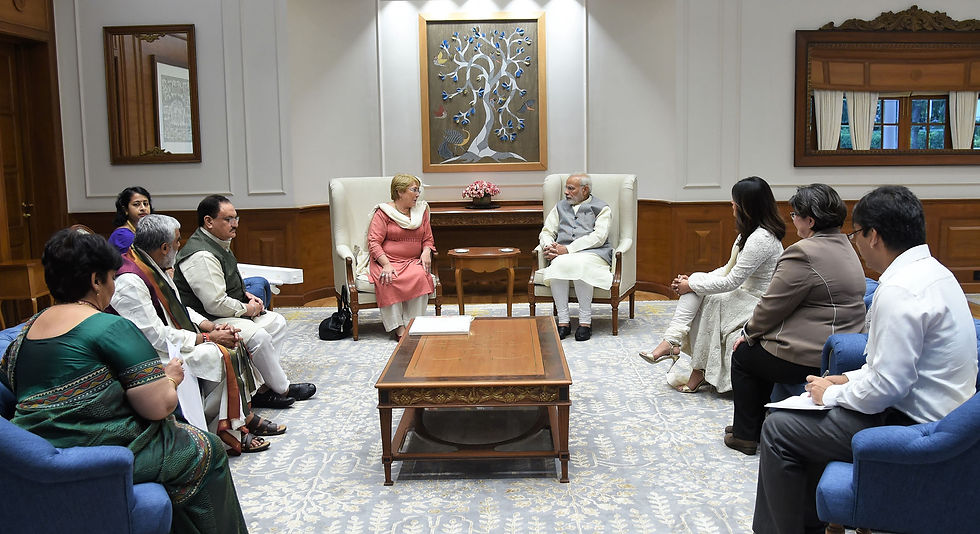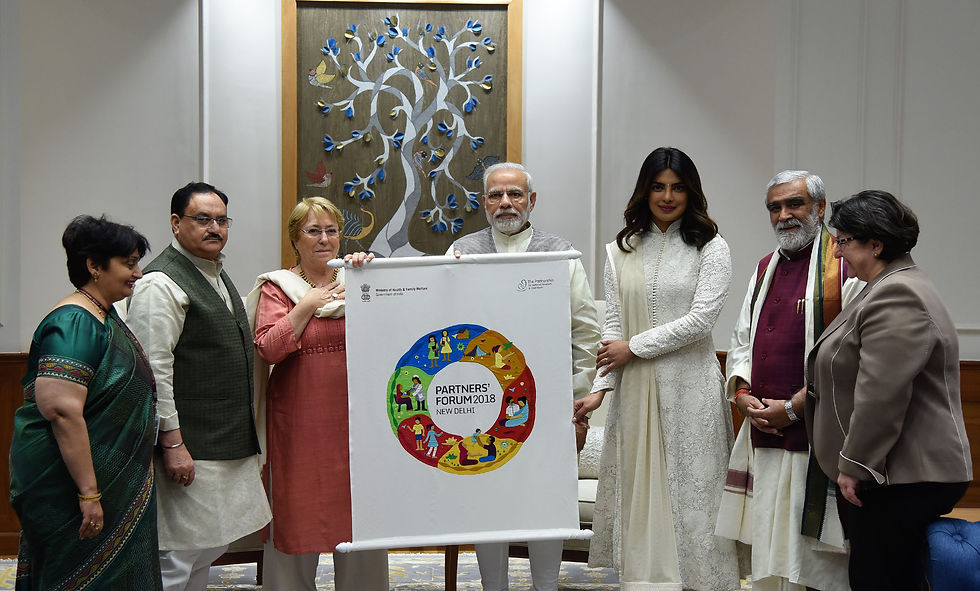Ayushman Bharat will benefit around 50 crore people
- Sanjay Trivedi
- Apr 12, 2018
- 4 min read

“Convergence between Ministries, States and stakeholders is critical to achievements of shared goals for health of women, children and adolescents.” This was stated by Shri J P Nadda, Union Minister of Health and Family Welfare at the curtain raiser event for the 2018 Partners’ Forum, a global event which will provide a unique platform for learning and exchange between countries on reproductive, maternal, newborn, child and adolescent health (RMNCH+A). Speaking at the function, Shri Nadda further stated that the Government is committed to collaboration for expanding universal health coverage for women, adolescents and children.
Shri Ashwini Kumar Choubey, Minister of State for Health and Family Welfare, Smt. Anupriya Patel, Minister of State for Health and Family Welfare, Smt. Preeti Sudan, Secretary (Health), Dr Michelle Bachelet, former President of the Republic of Chile and incoming board chair of the Partnership for Maternal, Newborn and Child Health (PMNCH), Ms. Priyanka Chopra, Partners’ Forum Champion and UNICEF Goodwill Ambassador and Dr Aparajita Gogoi, National Coordinator, White Ribbon Alliance were also present at the occasion, along with other senior officials, advocates and experts. Highlighting the achievements of the Ministry, Shri J P Nadda said that we have accelerated our progress towards our target of 90% full immunization coverage. Earlier the increase in full immunization coverage was 1% per year which has increased to 7% per year through ‘Mission Indradhanush’. “We have launched the Intensified Mission Indradhanush (IMI), the special drive will focus on improving immunization to more than 90% by December 2018,” Shri Nadda said. The Union Health Minister further stated that India is officially acknowledged as being Yaws-free and has been validated for Maternal and Neonatal Tetanus Elimination (MNTE).
Shri Nadda further said that Ayushman Bharat-National Health Protection Mission (NHPM) is a major step towards Universal Health Coverage. It will benefit around 50 crore people (from about 10 crore families) by providing coverage from secondary and many tertiary hospitalizations. Shri Nadda also informed the participants that to provide comprehensive primary care, the Government will transform 1.5 lakh sub health centres to Health and Wellness Centres (HWC). “The Ministry is now moving towards provision of comprehensive primary care through the Health and Wellness Centres”, he said. He further stated that in a step towards provision of comprehensive primary care, the Government has initiated universal screening of common NCDs such as diabetes, hypertension and common cancers at the sub-centre and Primary Health Centre. “This will enable the strengthening of preventive and promotive health, improve patient referral and access to secondary care services, Shri Nadda added. Shri Nadda also highlighted India’s commitment to RMNCH+A through policy and programmes, including the new school health programme and implementation of UHC that drives progress within this strategic framework.
Underscoring the importance of the 2018 Partners’ Forum, Dr Michelle Bachelet said that cross-sectoral and multi-stakeholder partnerships were vital to push forward for progress on improved health at every life stage. Dr Bachelet emphasized the need for global sharing of best practices and technical expertise at the civil society, academic, private sector and governmental levels to change public discourse and lead society into adopting innovative methods to resolve issues and improve health indicators in children, adolescents and women. She introduced the 12 Success Factors case studies of best practice RMNCH+A programmes and initiatives which will be launched at the 2018 Partners’ Forum, including Intensified Mission Indradhanush.
Shri Ashwini Kumar Choubey, Minister of State for Health and Family Welfare said that quality, equity and dignity in healthcare are the core concepts addressed in the National Health Policy and that will drive progress towards achieving the Sustainable Development Goals. Shri Choubey stated that by ensuring the quality of maternal and newborn care in health facilities, preventable maternal and infant deaths can be ended by 2030, as envisioned by the EWEC Global Strategy to which India is committed.
Smt. Anupriya Patel, Minister of State for Health and Family Welfare, said that sanitation, hygiene and menstrual health of girls are high on Government agenda. She further stated that multi-sectoral collaboration is what stands out in the push for progress towards improved RMNCH+A outcomes. Gender inequalities and discrimination have clearly established effects on RMNCH+A outcomes, and these must be explicitly weaved in all discussion around women’s, children’s and adolescents’ health.
Ms. Priyanka Chopra highlighted the importance of a healthy childhood with good quality health care as it sets the course for positive adolescence, adulthood and parenthood. “We need to give girls the same opportunities as boys if we want them to be healthy and successful”, she said. She further stated that across the world, girls have become community leaders due to the support of the community. “Let’s start valuing the girl child. I hope that by lending my voice I can make a difference to their lives,” Ms Priyanka Chopra added.
The 2018 Partners’ Forum will be held in New Delhi on 12 and 13 December 2018. It will be a unique platform for learning and exchange for the alliance of 1,000 organizations to align objectives, strategies and resources, and agree on interventions to improve maternal, newborn, child and adolescent health. The Partnership for Maternal, Newborn & Child Health is an alliance of organisations in 77 countries from the sexual, reproductive, maternal, newborn, child and adolescent health communities, as well as health influencing sectors. Also present during the function were senior officers of the Ministry, representatives of PMNCH partners, as well as leading advocates, implementers and experts on maternal, newborn, child and adolescent health.










Comments